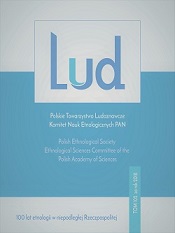KRADZIEŻE JAKO REGULATOR RELACJI SPOŁECZNYCH. WŁAMANIA DO MAZOWIECKICH DOMKÓW LETNISKOWYCH W LATACH 80. I 90. UBIEGŁEGO WIEKU W RELACJACH DZIAŁKOWICZÓW I LOKALNYCH MIESZKAŃCÓW
BURGLARY AND THEFTS AS A WAY TO REGULATE SOCIAL RELATIONS. BURGLARIES INTO SUMMER COTTAGES IN MAZOVIA IN THE 1980S AND 1990S IN OWNERS’ AND INHABITANTS’ ACCOUNTS
Author(s): Amanda KrzyworzekaSubject(s): Cultural Anthropology / Ethnology, Rural and urban sociology, Post-War period (1950 - 1989), Transformation Period (1990 - 2010)
Published by: Polskie Towarzystwo Ludoznawcze
Keywords: economic anthropology; anthropology of rural areas; theft; burglary; second homes;
Summary/Abstract: Burglary is an important aspect of relations between local inhabitants and second home owners. The climax of theft was observed in the eighties and nineties of 20th century and it has been fading in the 21st century. In this article I attempt to interpret this phenomenon in the context of economic anthropology, seeking the meanings that both groups attach to it as well as cultural and social background that influence both groups. I argue that most of stealing that took place in Morawinka was probably not economically motivated, but was a way of dealing with a worsening economic situation as well as with social changes that moved many of local inhabitants much lower in the social hierarchy. Burglary served as a way to deprive second home owners of their agency and independence. The problem disappeared when the second home owners were no longer perceived as an elite – wealthier, better educated, with a better social capital.
Journal: LUD
- Issue Year: 102/2018
- Issue No: 1
- Page Range: 257-277
- Page Count: 21
- Language: Polish

